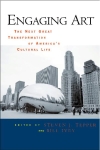« The Arts Experience vs. The ARTS (Warning!-- this entry contains a sports analogy) | Main | Was the past really like the present? »
June 16, 2007
Death of an expert
by Russell Willis TaylorDifficult to know what to add to so many insightful observations, so have been reading rather than writing. It is gratifying to see that we are beyond the "we don't want the world to change" stage, if not perhaps all at the same stage of acceptance that the delivery systems that we have invested untold millions in just may not meet the needs and wants of the next generation. This is not to say that there isn't a role for wonderful music beautifully played by professional musicians in a glorious concert hall, but is rather to say that perhaps we need to get to grips with the fact that this is far from the only experience of classical music that people want, and they may not want to experience as much of it as we wish to produce.
One of the respondents early on in this blog commented that "I'm not a great watcher. . . I like to be singing or playing." And there it is - a succinct affirmation that the unmet appetite is the participatory one. I think it goes much deeper than just the American Idol syndrome, or everyone wanting their fifteen minutes of fame. Some of you may have followed the story in both Wired and The Washington Post about a respected journalist who found he could not interview bloggers for a story, as they refused to have their words filtered through him as a professional journalist. This goes much further than just the curatorial me, it is an example of the zeitgeist telling us that the role of the expert is shifting rapidly. New technologies are not just helping people explore ways in which to be creative, they are giving people the outlet to be heard and are providing a powerful vehicle for the democratization of expression.
A recent study by five university psychologists analyzed results from the Narcissistic Personality Inventory (I'm not making this one up, folks) and demonstrated that since 1982 young people are experiencing an inexorable increase in the "positive and inflated view of the self." The academics speculated that technology may have something to do with it, but the point is that the next generation of viewers see themselves differently than our current audiences do, and in a pretty fundamental way. If we want anything we do to be of relevance, we have to see ourselves and the role we play in their lives differently to the same degree of radical change. This is not one for tinkering at the margins - this is a complete shift from being the expert to making each and every audience member the expert, and living with their freely expressed opinions.
The organizational structure of most of our business doesn't lend itself to change in this way, but Doug has admonished us to stick with one topic per posting, so I will save that for later.
Posted by rtaylor at June 16, 2007 7:13 AM
COMMENTS
The death of "experts" is certainly a good thing. it was 'experts" who told composers in the 1950s and '60s to write serialism or pack it in. Shame on them.
On the other hand, I'm not sure that swinging all the way to the other side of the spectrum and saying, in effect, "everyone's an artist" is such a great thing, either. The issue is quality. (Greg S. gave me a hard time about "raising the quality issue" in a comment to one of his earlier posts -- and that's cool, Greg -- but if quality isn't the issue, then why are all these pixels being spent in chin-strokes about the advent of untrained artists?) I suspect that, after a while, things will settle back into a middle ground, where mere access to media and the desire to "make art" are just not enough to make one an "artist."
I wrote about this last fall by way of a column for the Desert Advocate, a weekly here in Phoenix. The piece is now posted to my blog; follow this impossibly long link:
http://composerlafave.typepad.com/composerlafave_the_music_/2007/06/the_cult_of_the.html
Posted by: Ken at June 16, 2007 1:14 PM
Post a comment
Tell A Friend
Resources
Engaging Art: The Next Great Transformation of America's Cultural Life Chapter downloads MP3s Vanessa Bertozzi on audiences and participation Vanessa Bertozzi on involving artists in work Steven Tepper argues the historical context of arts in America
Abstracts
Chapter 4
In & Out of the Dark - (a theory about audience behavior from Sophocles to spoken word)
Chapter 7
Artistic Expression in the age of Participatory Culture (How and Why Young People Create)
Chapter 8
Music, Mavens & Technology
(all chapters in pdf form)
Steven Tepper talks about technology and the future of cultural choice
Lynne Conner on the historical relationship between artist and audience
Lynne Conner on event and meaning and sports
AJ Blogs
AJBlogCentral | rss
culture
Terry Teachout on the arts in New York City
Andrew Taylor on the business of arts & culture
rock culture approximately
Rebuilding Gulf Culture after Katrina
Douglas McLennan's blog
Art from the American Outback
Scott McLemee on books, ideas & trash-culture ephemera
Jan Herman - arts, media & culture with 'tude
dance
Apollinaire Scherr talks about dance
Tobi Tobias on dance et al...
media
Jeff Weinstein's Cultural Mixology
Martha Bayles on Film...
music
Greg Sandow performs a book-in-progress
Howard Mandel's freelance Urban Improvisation
Focus on New Orleans. Jazz and Other Sounds
Exploring Orchestras w/ Henry Fogel
Kyle Gann on music after the fact
Doug Ramsey on Jazz and other matters...
Greg Sandow on the future of Classical Music
Norman Lebrecht on Shifting Sound Worlds
publishing
Jerome Weeks on Books
visual
Public Art, Public Space
John Perreault's art diary
Lee Rosenbaum's Cultural Commentary
Tyler Green's modern & contemporary art blog
Special AJ Blogs
June 14-20, 2007



